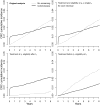The value of explicitly emulating a target trial when using real world evidence: an application to colorectal cancer screening
- PMID: 28748498
- PMCID: PMC5759953
- DOI: 10.1007/s10654-017-0287-2
The value of explicitly emulating a target trial when using real world evidence: an application to colorectal cancer screening
Abstract
Observational analyses for causal inference often rely on real world data collected for purposes other than research. A frequent goal of these observational analyses is to use the data to emulate a hypothetical randomized experiment, i.e., the target trial, that mimics the design features of a true experiment, including a clear definition of time zero with synchronization of treatment assignment and determination of eligibility. We review a recent observational analysis that explicitly emulated a target trial of screening colonoscopy using insurance claims from U.S. Medicare. We then compare this explicit emulation with alternative, simpler observational analyses that do not synchronize treatment assignment and eligibility determination at time zero and/or do not allow for repeated eligibility. This empirical comparison suggests that lack of an explicit emulation of the target trial leads to biased estimates, and shows that allowing for repeated eligibility increases the statistical efficiency of the estimates.
Keywords: Causal inference; Colon cancer screening; Target trial.
Conflict of interest statement
Figures
Comment in
-
Target trial emulation: teaching epidemiology and beyond.Eur J Epidemiol. 2017 Jun;32(6):473-475. doi: 10.1007/s10654-017-0293-4. Epub 2017 Aug 2. Eur J Epidemiol. 2017. PMID: 28770358 Free PMC article. No abstract available.
Similar articles
-
Conducting observational analyses with the target trial emulation approach: a methodological systematic review.BMJ Open. 2024 Nov 12;14(11):e086595. doi: 10.1136/bmjopen-2024-086595. BMJ Open. 2024. PMID: 39532374 Free PMC article.
-
Improving rheumatoid arthritis comparative effectiveness research through causal inference principles: systematic review using a target trial emulation framework.Ann Rheum Dis. 2020 Jul;79(7):883-890. doi: 10.1136/annrheumdis-2020-217200. Epub 2020 May 7. Ann Rheum Dis. 2020. PMID: 32381560 Free PMC article.
-
Specifying a target trial prevents immortal time bias and other self-inflicted injuries in observational analyses.J Clin Epidemiol. 2016 Nov;79:70-75. doi: 10.1016/j.jclinepi.2016.04.014. Epub 2016 May 27. J Clin Epidemiol. 2016. PMID: 27237061 Free PMC article. Review.
-
Reporting of Observational Studies Explicitly Aiming to Emulate Randomized Trials: A Systematic Review.JAMA Netw Open. 2023 Sep 5;6(9):e2336023. doi: 10.1001/jamanetworkopen.2023.36023. JAMA Netw Open. 2023. PMID: 37755828 Free PMC article.
-
Introduction to target trial emulation in rehabilitation: a systematic approach to emulate a randomized controlled trial using observational data.Eur J Phys Rehabil Med. 2024 Feb;60(1):145-153. doi: 10.23736/S1973-9087.24.08435-1. Eur J Phys Rehabil Med. 2024. PMID: 38420907 Free PMC article.
Cited by
-
Informing Healthcare Decisions with Observational Research Assessing Causal Effect. An Official American Thoracic Society Research Statement.Am J Respir Crit Care Med. 2021 Jan 1;203(1):14-23. doi: 10.1164/rccm.202010-3943ST. Am J Respir Crit Care Med. 2021. PMID: 33385220 Free PMC article.
-
Conducting observational analyses with the target trial emulation approach: a methodological systematic review.BMJ Open. 2024 Nov 12;14(11):e086595. doi: 10.1136/bmjopen-2024-086595. BMJ Open. 2024. PMID: 39532374 Free PMC article.
-
Effects of azithromycin in young adults with cystic fibrosis: a protocol for emulating a published randomised controlled trial using registry data.BMJ Open. 2025 Mar 25;15(3):e091357. doi: 10.1136/bmjopen-2024-091357. BMJ Open. 2025. PMID: 40132841 Free PMC article.
-
Association between lifestyle and metabolic syndrome incidence of workers in northern Okinawa, Japan: A cohort study.Prev Med Rep. 2022 Sep 19;30:101995. doi: 10.1016/j.pmedr.2022.101995. eCollection 2022 Dec. Prev Med Rep. 2022. PMID: 36203944 Free PMC article.
-
Novel methods for the analysis of stepped wedge cluster randomized trials.Stat Med. 2020 Mar 30;39(7):815-844. doi: 10.1002/sim.8451. Epub 2019 Dec 26. Stat Med. 2020. PMID: 31876979 Free PMC article.
References
-
- US Preventive Services Task Force. Bibbins-Domingo K, Grossman DC, Curry SJ, Davidson KW, Epling JW, et al. Screening for Colorectal Cancer: US Preventive Services Task Force Recommendation Statement. JAMA. 2016;315:2564–75. - PubMed
-
- Quintero E, Castells A, Bujanda L, Cubiella J, Salas D, Lanas Á, et al. Colonoscopy versus fecal immunochemical testing in colorectal-cancer screening. N Engl J Med. 2012;366:697–706. - PubMed
-
- Colonoscopy Versus Fecal Immunochemical Test in Reducing Mortality From Colorectal Cancer (CONFIRM) [Internet] [cited 2015 Jun 3]; Available from: https://clinicaltrials.gov/ct2/show/NCT01239082.
Publication types
MeSH terms
Grants and funding
LinkOut - more resources
Full Text Sources
Other Literature Sources
Medical


